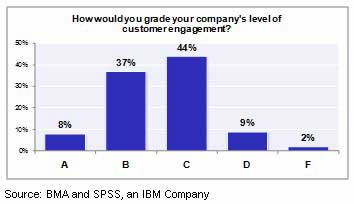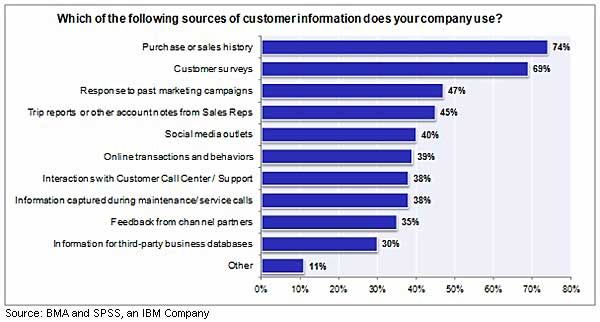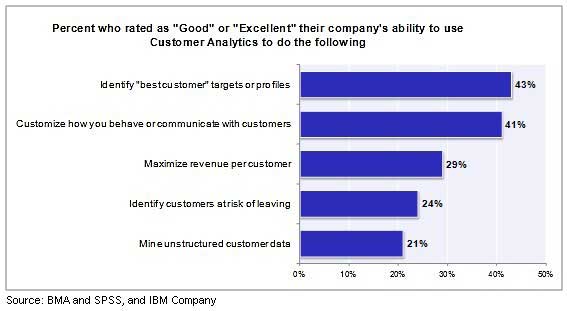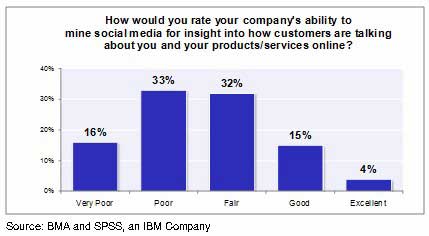Most B2B marketers say customer engagement is a high priority both within their marketing organization (72%) and across their entire company (58%), but they don't rate their company's level of customer engagement highly, according to a survey from the Business Marketing Association.
Moreover, 64% of surveyed B2B marketers say they use social media to engage customers, but far fewer report effectively mining those conversations for insight into customer opinions.
Below, other findings from the 2010 Customer Engagement Survey, conducted by SPSS—an IBM Company—for the Business Marketing Association (BMA).
Asked to grade their level of customer engagement, 43% of B2B marketers give their company a C, but more give their companies a D or an F and than those giving their companies an A: 11% vs. 8%.

Marketers are even more critical when they compare their customer engagement with the efforts of their B2C counterparts: 62% say B2B marketers lag behind B2C in engaging with their customers.
Despite such poor self-ratings, B2B marketers are motivated to create value both for their customers and their companies: 72% of surveyed marketers cite customer retention and loyalty as their primary impetus for customer engagement. Other top drivers are the better tailoring of products and services to customer needs (54%) and improving the customer experience (41%).
Sources of Customer Information
B2B marketers are fairly positive about their ability to listen to and capture information about their customers: 49% rate their capabilities in this area as good or excellent.
To support such customer engagement efforts, B2B marketers rely heavily on information collected through sales transactions (74%) and customer surveys (69%).

In addition, 47% of marketers rely on data collected from past marketing campaigns and 40% use social media outlets, such as blogs or social networking sites.
Customer Analytics Insights
However, B2B marketers are better able to capture customer information than they are to analyze it for actionable insights: 43% rate their ability to use customer analytics to identity "best customer" targets as good or excellent, but only 29% rate their ability to use analytics to maximize revenue per customer as good or excellent.

B2B marketers are also challenged in identifying retention risks within their customer base: Only 24% of marketers rate their abilities in that area as good or excellent.
Looking for great digital marketing data? MarketingProfs reviewed hundreds of research sources to create our most recent Digital Marketing Factbook (May 2010), a 296-page compilation of data and 254 charts, covering email marketing, social media, search engine marketing, e-commerce, and mobile marketing. Also check out The State of Social Media Marketing, a 240-page original research report from MarketingProfs.
Social Media Insights
Most B2B marketers now use social media as a channel for interacting with customers, but they don't fully capitalize on the information their customers share online: Just 19% rate as good or excellent their ability to mine social media conversations for insight into how customers are talking about their company, products, and services.

Nearly one-half (49%) say their companies are poor or very poor at mining insights from social media.
Those findings are in line with the customer-analytics findings noted above, according to which only 21% of B2B marketers rate their ability to mine unstructured text as good or excellent.
Other key findings:
- The primary technologies that B2B marketers use for customer analytics are survey software applications (52%), customer relationship management (CRM) or sales force automation (SFA) solutions (52%), and channel-specific analytics tools, such as those that support Web or email analytics (49%).
- 19% of B2B marketers say the responsibility for managing customer engagement and relationships falls solely within Marketing, 24% say it falls within Sales, and 39% say that responsibility is shared by multiple departments.
- 34% of B2B marketers say their company has a person tasked with improving customer engagement, and 7% expect to add such a position within a year.
- Only 20% of B2B marketers (those who tend to be from larger companies) say their marketing organization has someone in a full-time customer analytics role; 31% have someone focused on customer analytics on a part-time basis.
About the data: Findings are from a survey of 230 senior-level B2B marketers representing a wide range of industries and was conducted in April 2010; the data was collected and analyzed with IBM SPSS Data Collection survey software.



